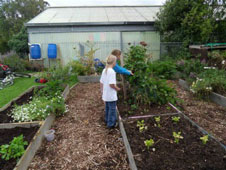 Tuesday 24 March 2015 8:50am
Tuesday 24 March 2015 8:50am
Edible gardens are taking off in New Zealand primary and secondary schools, presenting important new opportunities to promote fruit and vegetable consumption, new University of Otago research has found.
Researchers at the University's Cancer Society Social and Behavioural Research Unit have highlighted the innovation shown by New Zealand teachers in using their school garden as a teaching resource. Among 491 schools responding to a survey, more than half (52.9%) currently had an edible garden, with most having been started in the previous two years.
From learning about microorganisms to cooking soup, building bean frames to writing poetry, gardens were used across the curriculum as a 'hands-on' way of enhancing student learning.
Study co-author Carly Collins says, “Those involved in the edible gardening projects were obviously very passionate about sharing them with us – when our surveys were returned to us we also received a variety of photos, school newsletters, DVDs and posters highlighting their hard work.”
As well as being used to teach specific curriculum areas, edible gardens were also seen to resonate with schools' values, such as sustainability, partnership between school and home, work ethic, community service, practical skills, pride and respect.
“The challenge now is to ensure that schools are supported in order to maintain long-term success and sustainability of the gardens,” says Mrs Collins.
“Many of the schools commented that sourcing funding was a barrier to continuing the garden, with several staff members reporting that they pay for plants and equipment themselves.”
The findings appear in in the Health Promotion Journal of Australia.
For more information, contact:
Mrs Carly Collins
Tel 03 479 7582
Email Carly.collins@otago.ac.nz
About the CS SBRU
At the Cancer Society Social and Behavioural Research Unit (SBRU), we have received core funding from the Cancer Society of New Zealand and University of Otago since 1990. One of our priority research areas is support for health physical activity and nutrition as a means to reduce cancer risk. This study was conducted as part of this programme of research as there is evidence the patterns of good nutrition and physical activity established in early life can be beneficial into adulthood. School gardens are a means of connecting children and adolescents with the process of growing fruit and vegetables and, in some schools, also to have the opportunity to cook and share this produce with friends and family.
A list of Otago experts available for media comment is available elsewhere on this website.
Electronic addresses (including email accounts, instant messaging services, or telephone accounts) published on this page are for the sole purpose of contact with the individuals concerned, in their capacity as officers, employees or students of the University of Otago, or their respective organisation. Publication of any such electronic address is not to be taken as consent to receive unsolicited commercial electronic messages by the address holder.